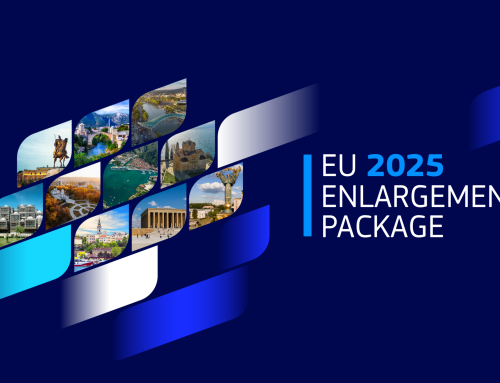Serbia’s accession to the EU is not only this nation’s own stated strategic goal, but also the EU’s firm and unquestionable objective.The process, which began in 1989 with the fall of the Berlin wall, would only be complete with the accession of all the countries of Western Balkans to the European Union, Johannes Hahn, Commissioner for European Neighbourhood Policy and Enlargement Negotiations, said in Belgrade today.
In his speech at the event “EU-Serbia: A strategic partnership for the future”organised by the National Convent for the EU and the ambassadors of the EU member countries, Hahn stressed that European Commission has clearly stated it would further intensify its work with the Western Balkans region in its strategic priorities, “in particular with Serbia and Montenegro as frontrunner candidates, for their successful EU accession.”
“So there can be no question at all about where we are heading together,” Hahn said.
Noting the estimate by the European Commission President Jan Claude Juncker that Serbia and Montenegro could join the EU in 2025, Hahn said it was a “timeframe that is possible.”
Hahn said that EU’si “commitment to Serbia is firm.” He stressed that EU and its member states “are by far Serbia’s first economic partners, in volume of trade, in terms of foreign investment and in financial assistance” that have not been in a “form of loans”, but “non-repayable grants which we invest in your country, some EUR 3 billion since 2000.”
“All this is a philanthropic gesture. This is an investment in peace, prosperity, stability and security. It is a joint guarantee for the EU and Serbia’s safe and prosperous future,” the Commissioner said.
Hahn indicated that EU “is not some heavenly political creature. It is not political paradise. As in all clubs, its membership comes with a few strings attached.”
However, friendship of other nations “comes with big Trojan horses.”
“Frankly, I believe that joining the world’s largest and wealthiest market is a pretty good plan! At least I don’t see a better one for this region,” he said.
So-called Western Balkans region was once “seen as the backyard of Europe,” he said, but nowadays “is an enclave in the European Union, with the legitimate right to join.” Hahn said that EU’s interest was to have stability in this part of Europe, which has still been quite sensitive, and that EU needed strong, balanced regions throughout Europe.
According to Hahn, Serbia’s key priorities on its path towards EU are the rule of law, reforms and a dialogue with Pristina.
Hahn estimated that the Serbia’s advance in the accession process was “stable”, and added that, besides 10 already opened chapters, three more were being discussed that could be opened in a near fitire. He added that he 2would be very pleased if we could open all chapters in the next 12 to 18 months.”
“The pace of Serbia’s accession negotiations actually depends on Serbia’s proven ability to implement reforms, in particular in the rule of law area,” Hahn estimated, adding that the rule of law issue was a key priority Serbia should focus on.
He added that “strengthening the independence, impartiality and efficiency of the judiciary, stepping up the fight against corruption and organised crime, creating an environment that fully guarantees the freedom of expression and the media are not minor challenges”.
In regard to the process of normalisation of relations with Pristina, Hahn said that Brussels “because we don’t want to import” the issue of Kosovo* “through our own back door,” adding that the normalisation of relations had a “direct impact on further progress in your (Serbia’s) accession negotiations.”
“Enlargement is clearly based on the own merits of each country. You hold your own key to the door of our Union! But the EU must see a permanent, binding, sustainable and irreversible normalization of relations before Serbia’s final accession. We don’t want to import this issue through our own back door,” he said.
Hahn said that he did not come to Belgrade to say how the leaders of Serbia and Kosovo should run a dialogue, nor to offer a final solution.
“I also see the great historical opportunity now to reach out to the other side and find a lasting solution for this issue, which has haunted your country and the region for too long,” he said.
Noting that reconciliation did not mean denying the facts and the responsibility for them,or just turning the page, but learning from history and building a better future together, Hahn said that “courage, vision and the sense of realism” wew needed for that.
“Being a patriot and a European is not a contradiction… they are two sides of the same coin. if you do not get it right under your own terms and ideas and miss this rendezvous with history, others will try to make choices for you, to your detriment,” Hahn said.
Such decisions, he added, “require the widest possible national consensus” and “this is why the initiative of President Aleksandar Vučić to launch an internal national dialogue is a very important step in the right direction” which “demonstrates his vision, his realism and his strong commitment to his nation and its interests.”
In an interview to “Večernje novosti“ daily, the Commisioner has also spokend about “internal dialogue” about Kosovu http://www.novosti.rs/vesti/naslovna/politika/aktuelno.289.html:685896-Han-Vucicev-poziv-na-dijalog-je-hrabar-potez, while in an interview to Telegraf.rs news portal, he spoke about possible timeframes of EU enlargement http://www.telegraf.rs/vesti/politika/2895986-ekskluzivno-johanes-han-za-telegraf-srbija-moze-u-eu-i-pre-2025-godine-ovo-je-uslov-foto




